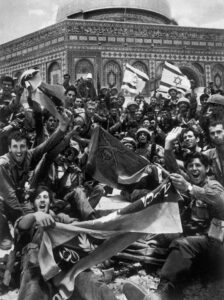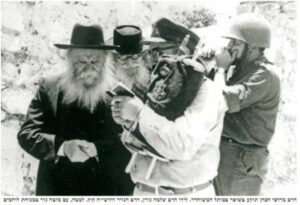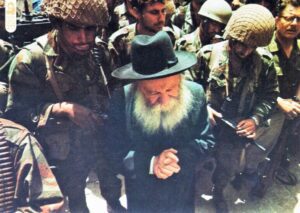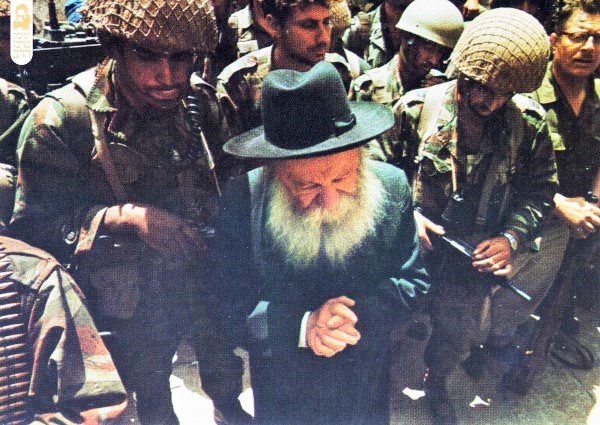“Har HaBayit B’Yadenu!”

by HaRav Shlomo Aviner, excerpted from his book “Rabenu.”
HaRav Tzvi Yehuda recalled: “We are reminded of that very Wednesday. How is it possible not to remember? It is impossible to forget. An emissary of the Chief Rabbi of Tzahal, HaRav Goren, came to me. To hear the news, we were of course incredibly excited. Afterwards, a telephone message arrived from Rav Goren. We did not have a telephone in our house, but messages sometimes came to us through our neighbors. Rav Goren wanted us to know that they were drawing near the Old City, and that he and our paratroopers were currently located in the area of Rockefeller Museum. He stated that they were going to the Kotel and that I should be ready to travel there. When the driver arrived, I asked him: ‘How did you enter?’ He said to me: ‘All of the gates of the Old City were open before us.’ He brought me there in an army jeep. We drove and drove. I asked him: ‘Where are you bringing me?’ Suddenly he said to me, ‘We are on the Temple Mount.’ I was dismayed. We were across from their building (the Dome of the Rock). The passage was through the Lion’s Gate. It was then impossible to approach any other way. They therefore brought me in through this route. There were groups of young men there. Large groups of soldiers from our army were passing on all sides, and I heard a voice yell to me: ‘HaRav Tzvi Yehuda!’ This was Chanan Porat, one of our students. There were other Torah scholars, a large camp of soldiers of Tzahal who were Torah Scholars! We arrived at the Kotel. We danced with the soldiers, we rejoiced with excitement, we embraced and kissed each other in ecstasy. There is no need to relate the genius, the righteousness and the holiness of HaRav Goren, the Chief Rabbi of Tzahal who led the way with courage at the front of the army, at the front of the conquerors, armed with two weapons. Do you know what his two weapons were? A small Torah scroll and a small shofar! Afterwards, he said to me: ‘We have completed this rendezvous at the Kotel, now I am going to Hevron.’ I looked at him in alarm. I could not understand. Master of the Universe! What is the meaning of this? He was going to Hevron with the two weapons, with the small Torah scroll and with the small shofar! The next day they informed me in the afternoon (after the conquest of the Cave of the Patriarchs) that Rav Goren was at the house of his father-in-law, Rav David Kohen in Jerusalem. ‘Were our mouths as full of song as the sea…we still could not thank you sufficiently,’ (from the prayer ‘Nishmat’ recited on Shabbat and holidays). How is it possible, Master of the Universe, not to see Your Hand in all this? How is it possible not to fill ourselves with faith, how is it possible not to fill ourselves with the most glorious holiness for what the Master of the Universe has done, does, and will do for us, before the entire world, before all of the Gentiles, before all of the believers and all of the non-believers?”

Right after the liberation of the Temple Mount, HaRav Tzvi Yehuda and HaRav David Kohen, “HaNazir,” Rabbi Goren’s father-in-law, were brought to the Kotel in an army jeep. They were not told about the route the driver had to take through the Old City. Suddenly, to their surprise and chagrin, they realized they were on the Temple Mount, but they decided it was acceptable for the moment to be on the Temple Mount, based on the concept of “kiboosh” (acquiring the Land of Israel through conquering). In general, it is forbidden to be on the Temple Mount today (because we are impure). On the way back from the Kotel, HaRav Tzvi Yehuda wanted to return by a different route, but they were told that it was dangerous, so they went through the Temple Mount once again. 33
It was so very natural that the first citizens who arrived at the Kotel on the first day of its liberation were HaRav Tzvi Yehuda and HaRav David Kohen, “The Nazir.”

Regarding the Mincha prayer which he prayed with the paratroopers, HaRav Tzvi Yehuda said, “This was like the prayer of Neilah in the Yeshiva (the concluding prayer of Yom Kippur).”
When the book, “B’Shesh Acharei HaMilchamah” of Yosi Gamzu was published, it included the song “HaKotel.” One of the stanzas began: “He stood facing the Kotel, with us, the elderly Rabbi,” accompanied by the picture of HaRav Tzvi Yehuda. Rabbenu commented, “I am not elderly.” 34
On one Shabbat during the time of the British Mandate, HaRav Tzvi Yehuda had an intense yearning to cleave to the Divine Presence which rests on the stones of the Kotel. But what could he do? The British placed a closure on the movement of the Jews, and the Kotel was off-limits. HaRav Tzvi Yehuda decided to go anyway. He went to Jaffa Street and began to march in the direction of the Old City. From one of the alleyways, an elderly Sefardic Jew who looked like a Rabbi came out to greet him. He asked HaRav Tzvi Yehuda where he was going. “To the Kotel HaMa’aravi,” he replied. The elderly man suggested they go together. HaRav Tzvi Yehuda asked him, “Does his honor know that there is a closure and that there will certainly be many British soldiers at the Jaffa Gate of the Old City who will not allow us to pass?” The saintly-looking man replied with a voice of assurance, “When we reach the Jaffa Gate, recite with me the verses that I tell you from Tehillim and everything will be fine.” They continued on together until they approached eight soldiers standing shoulder-to-shoulder, with rifles in their hands, ready to shoot. HaRav Tzvi Yehuda asked his mysterious acquaintance how they were going to get past the guards. He said: “I told you, recite the verses with me and do not look at the soldiers at all.” They recited the verses together and passed by the soldiers as if the soldiers did not see them. The Arab market was very crowded at that time and when they approached all of the Arabs moved to clear the way, saying: “This is a great master.” They thus reached the Kotel.
Students asked HaRav Tzvi Yehuda how he returned, and if the mysterious man had waited for him. He said that his escort disappeared, but that returning was no problem. They also asked if he ever saw the stranger again. Rabbenu replied that he saw him a few times when he attended circumcisions in Sha’are Zedek Hospital (which was originally housed in a building on Jaffa Street). They further asked which verses they had recited, and he said that it does not matter since one cannot rely on such things, even in a similar situation.
This story was once told to HaRav Rafael Levin, son of Reb Aryeh Levin – the “Tzaddik of Jerusalem.” “What?” he exclaimed. “You don’t know who the elderly man was? It is not clear to you that it was Eliahu HaNavi?”
Interestingly, during Motza’ei Shabbat classes, HaRav Tzvi Yehuda often spoke about Eliahu HaNavi, who, he said, reveals himself throughout the generations, from ancient times until now – and he would emphasize – to the most recent of times. 35
It once happened that two writers from the United States, a Jew and a non-Jew, were preparing a book and a film about Zionism. They met with one of the students of HaRav Tzvi Yehuda for many hours and were deeply impressed by him. The student brought them to meet the Rosh Yeshiva. Right away, they became excited, realizing that there was something unique about him, like meeting a prophet from ancient times. One of the writers said, “We are flying back to America, and we will return soon with all of the necessary equipment to film a movie about the settlements and Zionism today.” After three months, they returned to Israel and came straight to HaRav Tzvi Yehuda. Searching for a way to open the movie, they asked him: “We want to begin the movie by asking you a question. If you were given ten minutes to explain your position about the Jewish State to the President of the United States, what would you say, honored Rabbi?” HaRav Tzvi Yehuda gave them a wide smile, and said, “That’s nine minutes too long. I would say only two words: Chazarnu HaBaita – We have returned home!”






